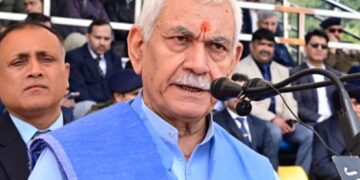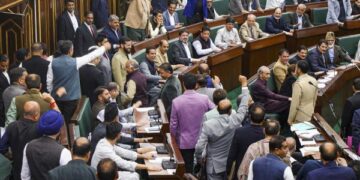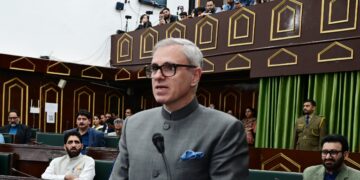Srinagar: Given “the loot of temple properties in Kashmir by false Hindu godmen” in connivance with land mafia, the High Court of J&K and Ladakh has directed the state apparatus to manage the temples and their properties in their entirety besides making arrangements for performance of religious rituals.
Hearing a writ petition by one Prem Jay Mishra, claiming to be the Mahant of Shri Bajrang Dev Dharam Das Ji Mandir, Sathu Barbar Shah, Srinagar, Justices Sanjeev Kumar and M A Chowdhary observed “the loot of temple properties became rampant after 1990 when the Kashmir valley came under the onslaught of militancy. These temples came to be abandoned. Taking advantage of this chaotic situation, so-called Mahants and Babas in connivance with locals encroached upon the properties of the temples.”
The bench directed that the management of the temple (Bajrang Dev Dharam Das Ji Mandir) and its properties in their entirety shall be taken over by the Deputy Commissioner (DC), Srinagar.
“The DC shall manage the temple and its properties including making arrangements for performance of daily puja and other religious rituals through a committee of officers of revenue and other departments, to be constituted by him.”
It also impressed upon the local police to provide all assistance to the district administration and the committee appointed to carry out its functions.
“The committee shall open up an account in the name of the deity/temple and deposit all the usufructs and the profits arising out of the properties of the temple. The committee shall, however, be entitled to utilize the amount so realized for better management and welfare of the temple,” directed the bench.
It further asked the DC to initiate appropriate steps to ensure that all encroachments over the temple properties are removed by following due process of law.
“The party/parties claiming right to perform puja and receive offerings or to claim management of the properties shall be free to agitate their rights before the civil court. No such suit shall be entertained or continued by any civil court unless the Deputy Commissioner/District Magistrate is arrayed as party defendant,” the judges directed.
They made it clear that in all the pending civil suits regarding temple or temple properties in question, the civil court shall array the DC as party respondent so as to avoid collusion between the parties.
“This position shall continue till the rights of the parties are conclusively determined by a civil court or the Government of Union Territory of J&K comes up with an appropriate legislation for all the charitable and religious institutions and endowments, as suggested by this court in its judgment dated 25th February, 2022 passed in PIL No.24/2018 titled Ajay Kumar Sharma v. State of J&K and others, whichever is earlier,” read their judgment.
The petitioner claimed to be the Mahant of Shri Bajrang Dev Dharam Dass Mandir, Sathu Barbar Shah (temple property) and had prayed to throw challenge to a 2017 communication of the District Magistrate, Srinagar that withdrew the order allowing one Dr Jai Ram Dass to perform puja in the temple in question and entrusted the daily affairs of the temple to Baba Dharam Dass Ram Jevan Dass Trust.
The petitioner claimed that the pujari of the temple Mahant Jai Ram Dass had appointed him as Mohatamim/manager of the temple property by virtue of a declaration executed on 01.12.2015. The petitioner, therefore, stakes claim over the right to perform puja and other religious rituals in the temple.
The judges held that the temple property in question vests in the deity and, therefore, none of the parties to this petition or anybody else can stake claim over it. There is nothing on record on the basis of which this court can come to a conclusion as to how this property came to be dedicated to the temple, they said.
The office of Mohtmim/manager is not a hereditary office and, therefore, the successor of a Mohatmim/manager of a temple and its properties cannot, as a matter of right, succeed to be the next manager of the properties of the temple, they added.
The bench said “It is in the absence of a properly written document governing the management of the temple property, the vested interests have staked their claims over the temple properties” adding that many such properties of temples, which came in the hands of different vested interests, were either sold/leased out or encumbered to the serious prejudice of the temples and their management.
It said, “Since most of the temples and their properties were situated in urban areas, as such, due to their high value, the vested interests started litigating with each other, some staking their claims on the basis of recorded entries in the revenue record and others on the basis of trust deeds executed by them inter se without any authority of law”.
It further went on to say “The instant property, too, has become a victim of the situation and to some extent apathy of the government. None of the parties have in their possession any legal document to substantiate their claim either to manage the temple and its properties or to offer puja and prayers in the temple.”
In the meantime, the court passed similar orders with regard to two other temples in the vicinity including Shri Baba Dharam Dass Ram Jevan Dass Trust Sathu Barbar Shah Srinagar and Shri Baba Dharam Das Ram Jeevan Dass Trust Bishembar Nagar.
Disposing of another petition, the court directed DC Baramulla to take over the property in the name of a Dharamshalla at Kreeri Baramulla.
“The District Magistrate shall be free to appoint a committee of officers of revenue and other departments for the said purpose,” directed the court.








